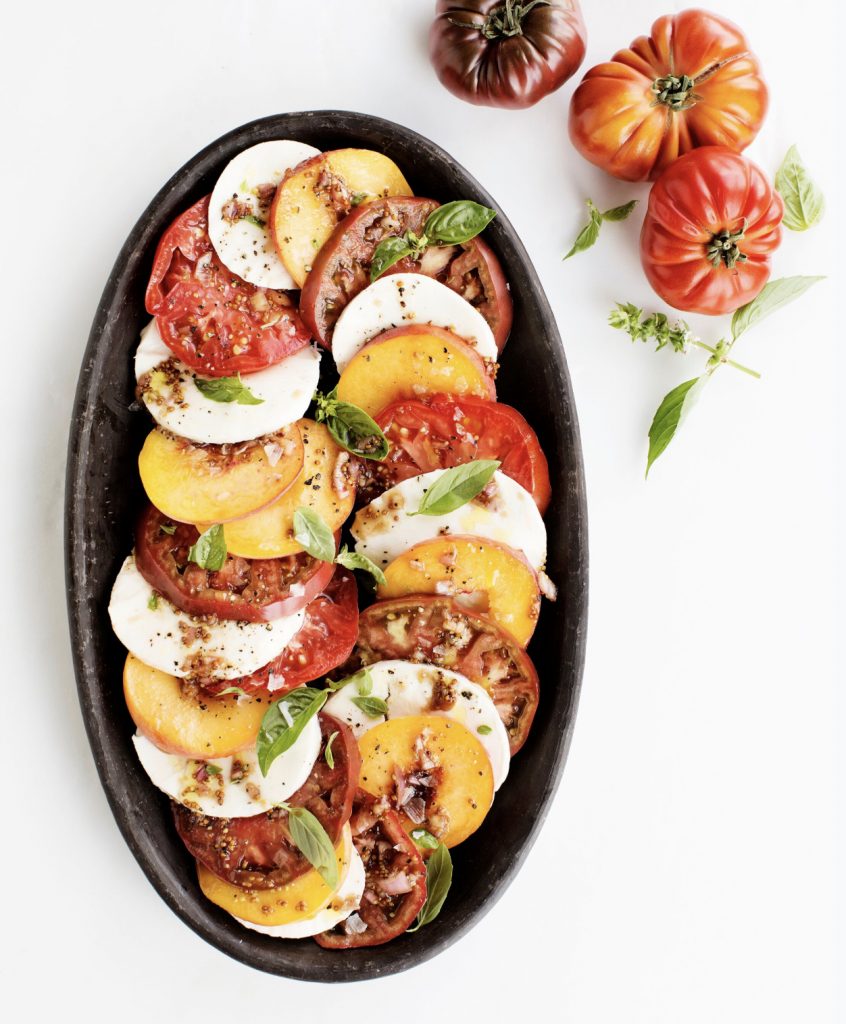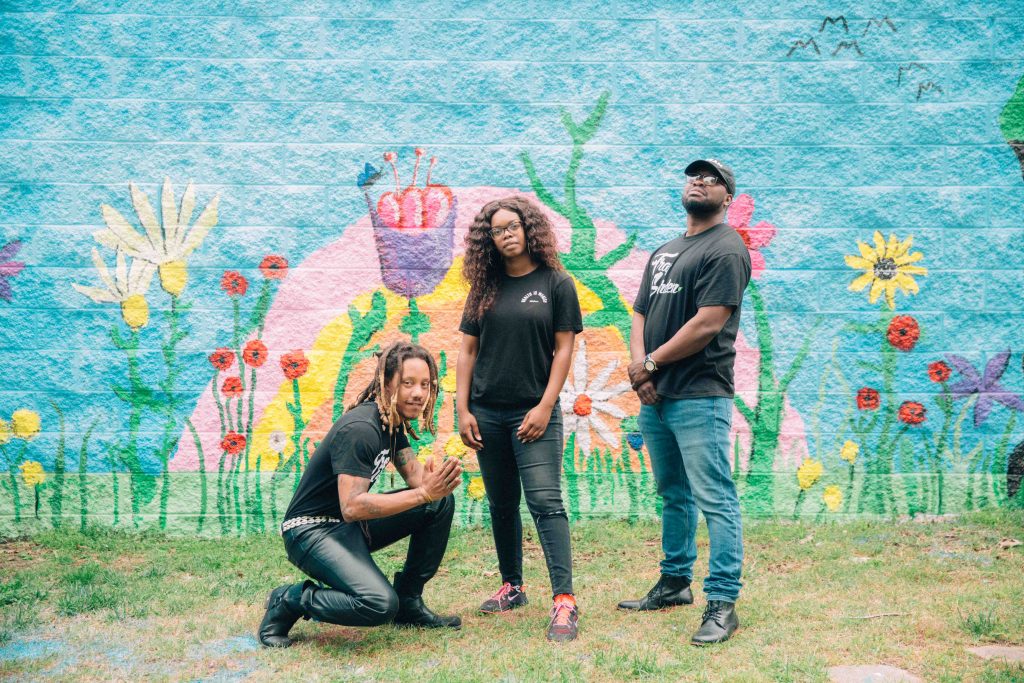
It’s raining the Saturday before Earth Day. Not a torrential downpour by any means, but one of those perpetually hazy, gusty days that feels like the city is set in the Blade Runner universe. Certainly not an ideal day for outdoor activities, least of all manual labor. But as I pull into the back parking lot of Johnson Alternative Learning Center in South Nashville, wipers working hard, my windshield begins thumping to the anthemic beat of “Act Up” by City Girls. I have made it to the Trap Garden.
Trap Garden is not a plot of fertile land, but a 501(c)3 nonprofit that Rob “Rob Veggies” Horton founded in 2014 after becoming discontent with the fact that he had to drive for miles to find a store that sold fresh produce in his community. “I got frustrated to the point where I said, ‘You know what? I’m going to see if I can grow my own. And if I fail, then I can’t really complain too much about what is available to me at the local grocery store,’” Horton says. He began his gardening career at Tennessee State University’s garden, and now his organization operates two community gardens where neighbors can harvest their own plants and vegetables on a first come, first serve basis.
The Trap Garden name, Horton explains, comes from the fact that when he was growing up in St. Louis, he was more likely to see an actual trap house than he was a community garden. When he moved to Nashville to attend TSU, he noticed a lot of the same problems. But the name also has a deeper meaning.
“Really it was about that work ethic. Somebody who was working within a trap house, you know, they’re putting out an illegal item,” Horton says. “It’s the actual work ethic that they put into creating that item. So trying to get repeat customers, trying to get them hooked on whatever it is they’re trying to put out in the streets. We’re just trying to get people hooked on fresh, healthy, good items that are going to be good for their body.”

With a name that evokes illicit activity and abandoned buildings, there were some skeptics at first. Those critics, Horton says, didn’t understand the cultural influences of not only trap houses but trap music.
“If you don’t come from a community or you don’t have a background in understanding not only what the name means but also the music perspective—trap music is something that’s very influential as well,” Horton says. “Those are things that people did not initially understand if they didn’t come from similar backgrounds of the communities we service.” Horton’s favorite trap song, for what it’s worth, is “That’s What’s Up” by Yo Gotti.
On the day I meet Horton, Trap Garden is hosting an Earth Day event at their community garden at Johnson ALC, planting everything from flowers to basil to peppers. Despite the less than favorable conditions, about fifty people—including kids—are clad in gloves, work boots, and rain jackets and tending to the garden, which is located on the school’s property.
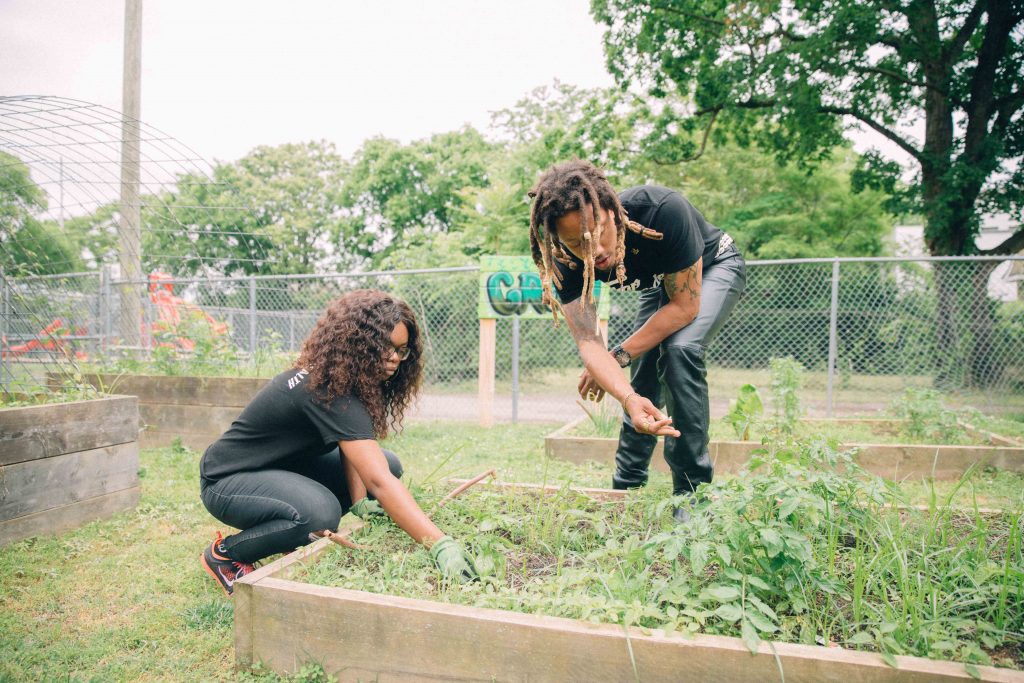
Horton’s organization has two main goals. The first is to combat food deserts in Nashville by providing fresh produce in community gardens. Food deserts, for urban areas, are defined as low-income neighborhoods in which a supermarket is more than a mile away. In 2014, the Tennessean reported that one in five Nashville residents live in a food desert. Metro Nashville’s website identifies four food deserts in the city: North Nashville, East Nashville, South Nashville (Edgehill), and Napier-Sudekum. Johnson ALC is in the Napier-Sudekum neighborhood.
Another contributing factor to what makes a food desert is a community’s access to transportation. Looking at data on the USDA’s Food Access Research Atlas, you can see that in certain neighborhoods surrounding TSU’s campus, for example, over 20 percent of residents do not have a car and live over half a mile away from a supermarket. This makes grocery shopping difficult, and also forces individuals—usually low-income individuals—to purchase food at convenience stores where fresh, healthy items are scarce.
At the Earth Day event, Horton introduces me to Don Frost, a Trap Garden team member who has lived in the neighborhood near Johnson ALC for over five years. Even for those who do have cars, Frost says, access to fruits and vegetables is not easy. Residents can literally be blocked from getting to a supermarket.
“Once the train stops on the one-way street from 4th Avenue, there’s not a good way to get to a grocery store—to get to 8th Avenue—if you want to get some fresh produce,” he says. “Those opportunities aren’t available in this proximity.”
This is why the community gardens are vital. For people who live far from supermarkets or don’t have a means of driving to one, they can come to the garden at Johnson ALC and have their pick of peppers, squash, green beans, asparagus—whatever is in season. The same goes for the neighbors near Trap Garden’s other community garden at Buena Vista Elementary. And it’s all free. Frost adds that the garden has also helped him connect with his neighbors. “I can go to a cookout whenever I want to,” he says.
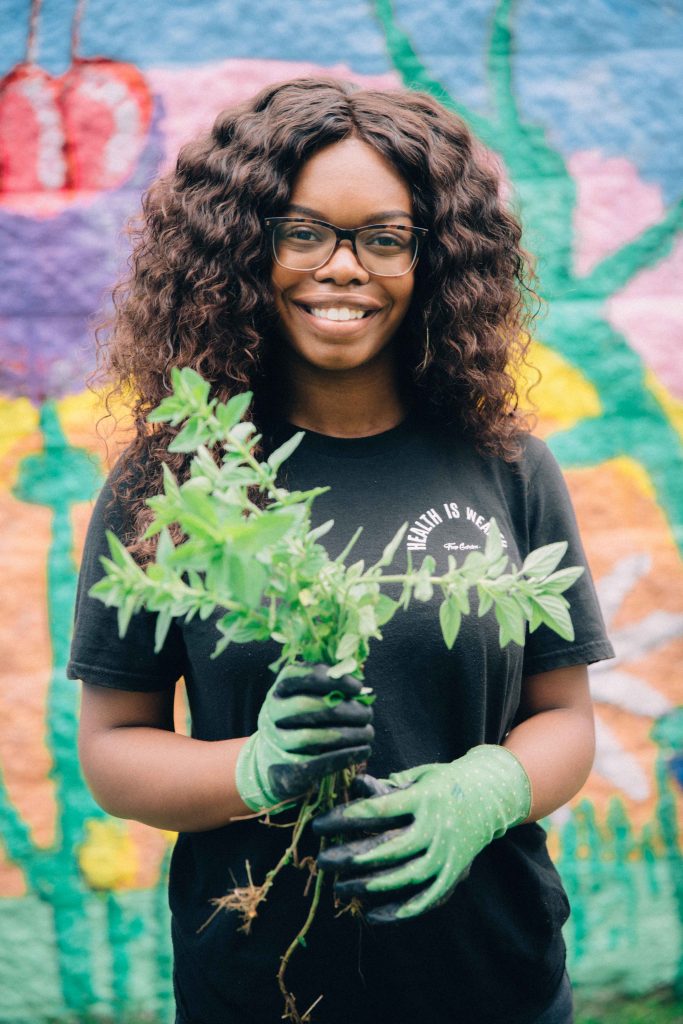
The second main goal for Trap Garden is community outreach and education. Horton introduces me to Kanita Hutchinson, a masters student in agriculture business at TSU who has been working with Trap Garden since she was an undergraduate student. After starting as an intern, then moving up to volunteer coordinator, Hutchinson is now Trap Garden’s program director. She works closely with youth in the community to show them how to grow and prepare fresh vegetables.
“We have our Eat, Live, Grow program over at Buena Vista Elementary,” Hutchinson says. “We get a chance to have [students] try different foods they wouldn’t normally try . . . Third graders are very brutal, honest people.”
Despite their candid reviews, Hutchinson says the kids have been overwhelmingly receptive to the idea of eating predominantly vegetarian meals. But it’s the parents that do the shopping and cooking, so how is the Trap Garden making sure these new habits make their way to the students’ homes?
“With the adults, we have cooking demonstrations,” Hutchinson says. “Those are free.” Even the Earth Day celebration functioned as a learning experience for many in attendance. Volunteers were introduced to the nuances of soil ratios, lasagna mulching methods, even how to construct a compost bin and what to put in it. Connecting people, Hutchinson adds, is Trap Garden’s greatest strength. Most of the organization’s volunteers were first-time gardeners before using the community gardens, so they rely heavily on the teach one, grow one method.
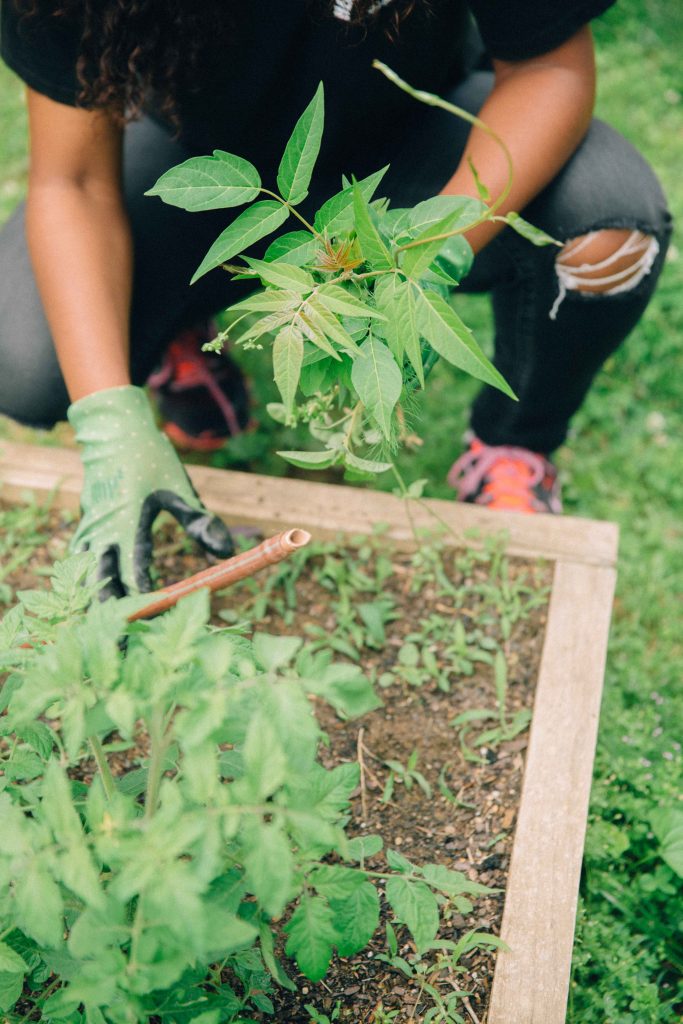
Social media has also proved invaluable to Trap Garden. With close to five thousand followers on Instagram alone, Horton and his team are able to spread the word about community events, recruit new team members, and share their FRSH Bite series, in which local influencers (like rapper and past NATIVE cover story Mike Floss) try vegan dishes prepared by the folks at Riddim N’ Spice. In their latest episode, Floss and others try soy chicken, though they aren’t told what they’re eating beforehand. “Y’all finna tell me it’s some wild shit. It’s clearly chicken,” Floss says in the video, cracking up. “At this point, y’all just lying for reaction.”
When I ask Horton what the organization’s biggest challenge is moving forward, he is quick to say gentrification in Nashville. They can’t serve their community if their community is being displaced by new developments.
“We don’t even know where these people are being displaced or moved to . . . and we probably won’t know until later census data is established and available,” Horton says.
The fact that Trap Garden does not own any of the land they grow on presents other challenges. The organization used to operate a total of four gardens. Now, they’re down to two. They lost the other two because the land was sold and the new tenants did not want to use the extra space as a garden for the community.
Of the four Trap Garden team members I speak with, only Artist Hall, the garden supervisor, was born and raised in Nashville. He says the rapid change of the city has served as somewhat of a wake-up call.
“Once communities and groups of people start to notice displacement or the change of settings, if you will, it gives you a mindset of what else is changing?” Hall says. “What else is being moved around and displaced?”
Food has become a part of that conversation. Just like traffic, insufficient public transportation, and scarce affordable housing, limited access to healthy food options is yet another unfortunate side effect of Nashville’s rapid transformation into It City. And these problems disproportionately affect low-income residents, usually people of color.
“These are the individuals that are doing those day-to-day jobs that make the city run,” Hall says. “So if you’re pushing them way out of town or setting prices so high that they can’t afford to live, what happens to the aspects around them? What happens to school? What happens to food?” For some people, Hall says, a tall and skinny being built next door forces them to think, How much time do I have left?
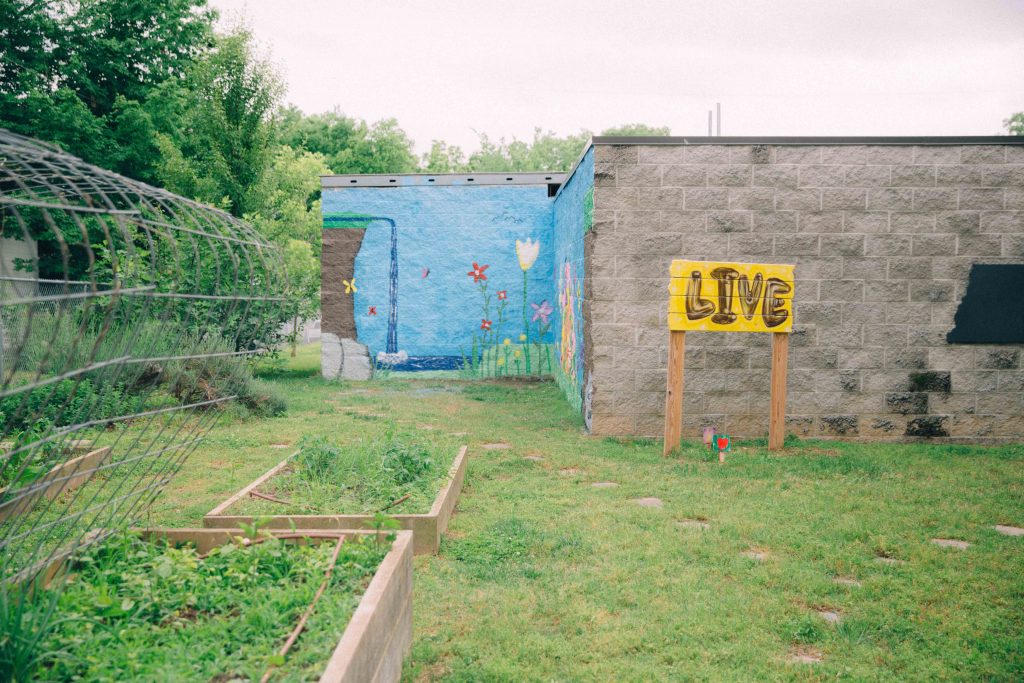
To make matters worse, efforts by local lawmakers to combat the food desert crisis have largely fallen short. In 2014, Democratic Rep. Harold Love proposed a house bill that would’ve diverted less than a tenth of a percent of money collected from a tax on sugary drinks to a fund created to help improve low-income communities’ access to healthy food. The bill never even made it to subcommittee. In 2018, the legislation was refiled and passed, but this time it only required a study on the costs and benefits of creating a special fund to provide relief to help eliminate food deserts, i.e. building grocery stores. That study recommended that the state should work to improve the already existing options for fresh food instead of building grocery stores in communities that need them.
Until neighborhoods like Napier-Sudekum actually have a grocery store with fresh produce, community gardens like the ones operated by Trap Garden are one of the few options for healthy fruits and vegetables. I ask Horton if they plan on buying land to create more gardens. He says no, that their goal now is to make the two gardens that they do have as strong as possible. That includes increasing their educational programming efforts to show that these gardens are helping the community.
“A lot of people are benefiting from Nashville, but not all people are benefiting from this growth in Nashville right now,” Horton tells me. “And so we’re just trying to make sure we’re supporting those who need it most.”
If you’d like to volunteer with Trap Garden, visit trapgarden.org or follow @trapgarden.
Suggested Content

Double Scoop of Happiness
Kokos Ice Cream creators Jerusa van Lith and Sam Brooker want to show you just how good ice cream can be.

